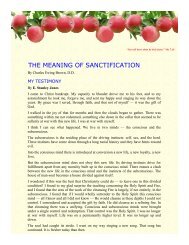W. B. Godbey - Enter His Rest
W. B. Godbey - Enter His Rest
W. B. Godbey - Enter His Rest
Create successful ePaper yourself
Turn your PDF publications into a flip-book with our unique Google optimized e-Paper software.
transfiguration, the human body is neither a member of the Church nor a citizen of the Kingdom, except in a<br />
modified, conventional sense. Therefore it will never really be known who does constitute the mystical spiritual<br />
body of Christ till the sons of God are made manifest in <strong>His</strong> glory, (Col. 3:3).<br />
The supernatural birth makes you a member of God's Church and a citizen of <strong>His</strong> Kingdom, just as the infants in<br />
the United States are counted in the census and signify as much in the citizenship as the adults, although they<br />
have nothing whatever to do with the government till they reach majority. In a similar manner regeneration<br />
makes you a citizen of the Kingdom, but during your minority you have no voice in the government, (Gal. 4:4),<br />
“But I say unto you so long time as the heir is an infant he differs from a slave as to nothing, even though being<br />
lord of all, but is under tutors and guardians until the time appointed by the father .” And verse 7, “So thou art<br />
no longer a slave but a son, and if a son indeed, an heir through God.” Here we have a contrast between infancy<br />
and adultage in the Kingdom. The minority is the servile period and the majority the filial. Now this is the same<br />
person all the way through, the difference simply consisting in his relation to the Divine government, before<br />
sanctification being a servant and afterward a son, both characters existing contemporaneously throughout, but<br />
during minority the servile predominating and after majority the filial.<br />
We have the same facts set forth in Heb. 13:14, “or every one partaking of milk is unskillful in the word of<br />
righteousness, because he is a babe, for solid food n for the perfect who have their senses exercised by use unto<br />
the discernment both of the good and of the evil.” Here we see the same two classes again contrasted by the<br />
phrases nelpios, an infant, and teleios, an adult, I. e., a perfect man.<br />
The Apostle here says the infant is unskillful in the word of righteousness, I. e., he does not well understand how<br />
to apply it to himself or to others, while the adult, or the perfect man, as the Greek says, has his spiritual and<br />
intellectual senses developed by use so that he can discriminate between the good and the evil.<br />
We have the same contrast developed in the parable of the virgins who represent the kingdom of Heaven on the<br />
earth. You remember how they all alike set out with lighted lamps to meet the Bridegroom, but afterward five of<br />
them concluded that security demanded that they should lay in a supply of oil for coming emergencies, the other<br />
five thinking that it was not necessary, as the lamps were burning very nicely and they were getting along real<br />
well. Eventually the Bridegroom came and they all started to meet Him. Now while the five who had laid in the<br />
supply of oil had no trouble whatever, you remember that the five who were delinquent in this respect utterly<br />
forfeited their place in the Bridehood. There is no intimation that they lost their place in the Kingdom. The<br />
English Version statement, “Our lamps are gone out,” led all of the old commentators astray on the subject,<br />
relegating them as apostates. The true reading, “Our lamps are going out,” indicates a low state of grace, normal<br />
to the unsanctified, but it is utterly incompatible with the conclusion that their state was graceless. They were<br />
still citizens of the Kingdom, but never had been members of the Bridehood.<br />
I have heard preachers contend stoutly for the identity of the Church and the Bride. This is a mistake which you<br />
will all readily see. Regeneration makes you a citizen of the Kingdom, (John 3:3) identifies you with the body of<br />
Christ, and makes you a member of the Church, (Eph. 1:23), but assuredly does not make you a member of the<br />
Bridehood, whose pre-eminent signification is the idea of wedlock. All brides are married and always imply the<br />
existence of the groom, the cognomenal counterpart, somewhere, either present or absent. It is one experience to<br />
be born into the Kingdom and an infinitely different one to get married to the Son of the King. The latter<br />
positively implies adultage, as infants are not marriageable. Our Lord is coming back to this world for <strong>His</strong> Bride<br />
only.<br />
He is certain duly to care for the infants, both spiritual and physical, but they are not members of <strong>His</strong> Bridehood.<br />
Those who enjoy the study of the sweet, precious Word and are delighted with the erudition of the Holy Ghost,<br />
the Author and Revelator of the deep things of God, would be much edified studying this book, “Church-Bride-<br />
Kingdom.<br />
The Booklets<br />
These are twenty-seven in number, all directly expository of the great and absorbing theme, “Holiness to the<br />
Lord,” which floods the Bible from the Alpha of Genesis to the Omega of Revelation. These booklets contain









